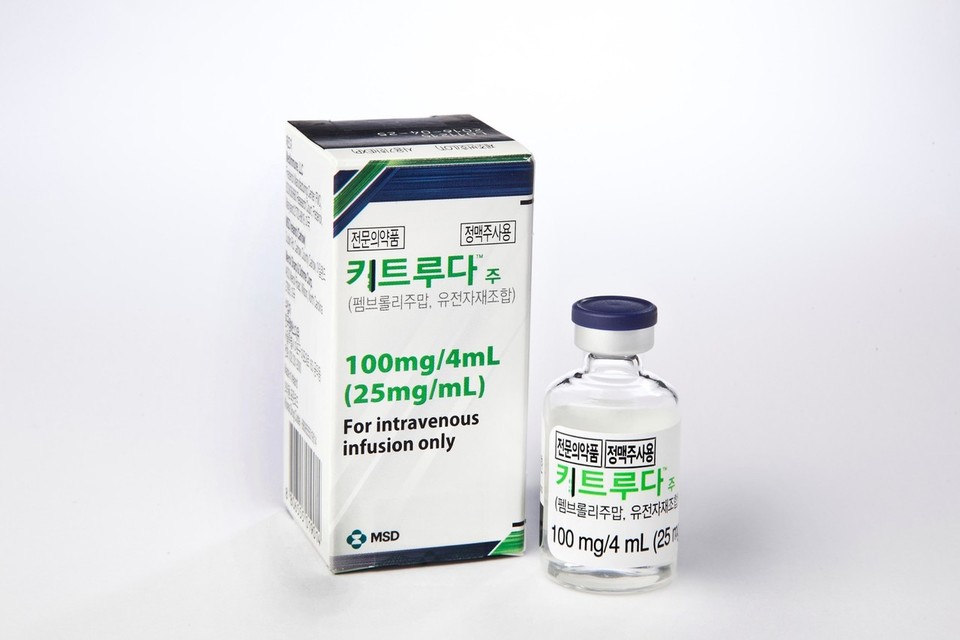MSD's Keytruda: 20-30% response rate addressed with an open-minded approach.
GI Innovation, Qurient, TiumBio, and more exploring combined use.

South Korean biotech companies are actively engaging in combination clinical trials with Merck's (MSD) anti-PD-1 immune checkpoint inhibitor, Keytruda (generic name Pembrolizumab), to augment the value of their pipelines by addressing the low response rates (20-30%) associated with immune checkpoint inhibitors. This strategic initiative involves utilizing Keytruda as a pivotal component to tackle the challenges posed by the limited efficacy of immune-oncology drugs.
Keytruda, an FDA-approved drug in the United States, has demonstrated high therapeutic efficacy. However, the general response rate is reported to be in the range of 20-30%, varying depending on the cancer type. To address this global challenge, over 1,500 combination clinical trials with Keytruda are currently underway, aiming to enhance response rates across diverse cancer types.
As of February 3rd, industry sources reveal active participation in clinical trials involving the combination use of Keytruda by companies such as GI Innovation, Qurient, TiumBio, PharmAbcine, MadPacto, and Genome & Company. GI Innovation is developing the next-generation immune checkpoint inhibitor 'GI-101A (development code),' a dual-fusion protein with simultaneous CD80 and IL-2 variant functions, currently undergoing a phase 1/2 clinical trial in South Korea and the United States in combination with Keytruda.
Qurient is focused on the development of a novel anti-cancer therapy, Q901, inhibiting CDK7 through a new mechanism. Q901 is an enzyme inhibitor with high selectivity and tissue penetration, currently in clinical development in the United States and Korea for solid cancer patients. A company spokesperson stated, "Q901 is a novel candidate substance with various mechanisms, including cell cycle regulation, DNA damage repair inhibition, and transcription control. We are currently conducting joint development with MSD on the combination therapy with Keytruda."
TiumBio is actively developing TU2218, a novel candidate substance aiming to maximize the efficacy of immune checkpoint inhibitors like Keytruda by simultaneously blocking the pathways of 'transforming growth factor-beta (TGF-ß)' and 'vascular endothelial growth factor (VEGF).' The company recently applied to the Ministry of Food and Drug Safety (MFDS) to modify the clinical trial plan from phase 1b to phase 2a, targeting progressive solid cancers.
PharmAbcine initiated drug administration to the first patient in the phase 1a/b clinical trial of VISTA-targeted immune checkpoint inhibitor PMC-309 in Australia. The trial involves PMC-309 monotherapy and combination therapy with Keytruda for patients with progressive or metastatic solid cancers, aiming to determine the maximum tolerated dose (MTD) and recommended phase 2 dose (RP2D)
MedPacto announced FDA approval for the Investigational New Drug (IND) application for the combination therapy of 'Vactosertib and Pembrolizumab' targeting metastatic colorectal cancer patients. This phase 2b/3 study aims to evaluate the efficacy of the combination therapy in patients who have previously been treated.
Genome & Company completed the first patient administration in the phase 2 clinical trial of GEN-001, a microbiome-based immunotherapy for cholangiocarcinoma (bile duct cancer), involving a combination therapy with the immune checkpoint inhibitor Keytruda.
Industry insiders suggest that South Korean biotech companies are actively pursuing combination therapy with Keytruda to enhance the efficacy of their immune oncology treatments. A representative from a biotech company emphasized, "Our own immune oncology treatment is the primary therapy, and Keytruda, administered in combination, serves as an adjuvant therapy." They added, "If the combination therapy with Keytruda demonstrates superior clinical effects compared to Keytruda monotherapy or conventional treatments, it increases the potential for business development (BD) opportunities."
관련기사
- 키트루다를 비빌언덕 삼아 파이프라인 밸류 높이려는 바이오텍들
- 티움바이오, 'TU2218' 임상 대상 담도∙두경부∙대장암 변경 신청
- HER2 양성 위암 1차 치료로 확대 '키트루다', 안주 없이 계속 '직진'
- 지아이셀, 지아이이노베이션과 'NK세포치료제·GI-101A' 병용 임상
- 파멥신, 면역항암제 'PMC-309' 호주 임상 1a/b상서 첫 환자 투여
- 메드팩토, 대장암 대상 '백토서팁 병용요법' 美 FDA 임상 승인
- "MSD와 손잡은 한미약품·큐리언트…유기적 협력 통해 결실 맺을것"
- 큐리언트, 美 AACR 2024서 'Q901' 신규 작용기전 발표

